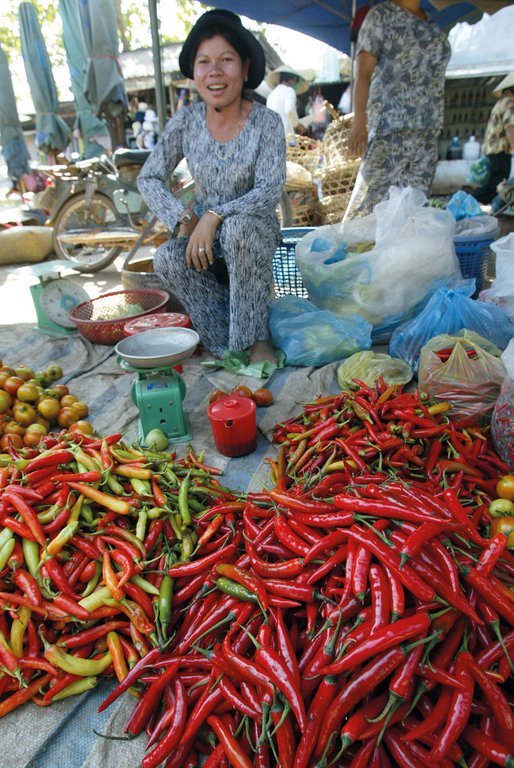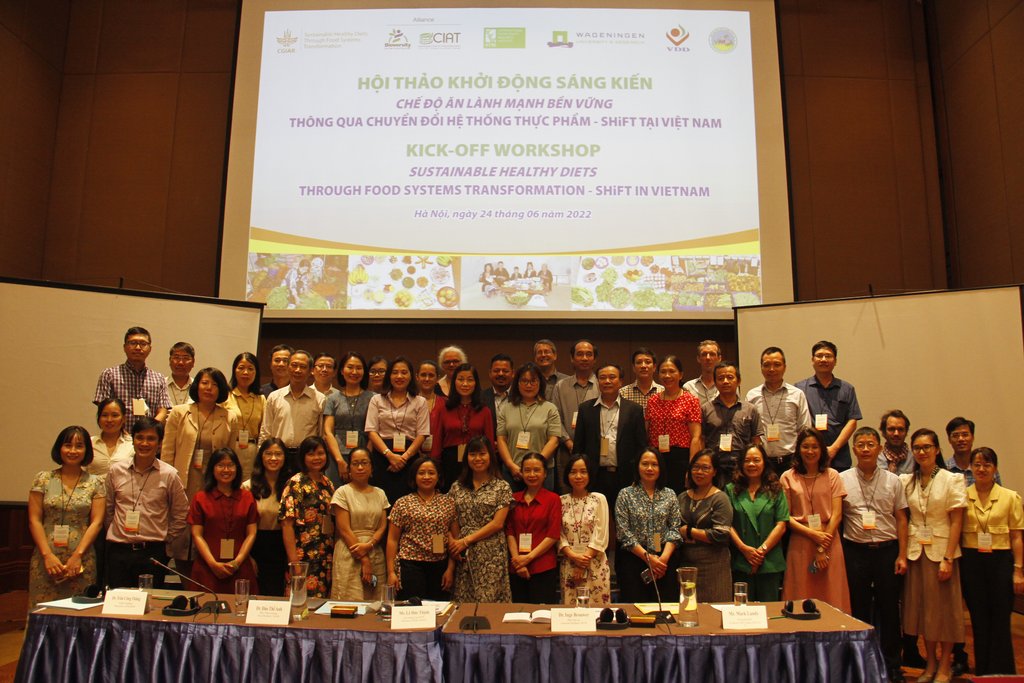 Download this article in magazine layout
Download this article in magazine layout
- Share this article
- Subscribe to our newsletter
Food systems transformation in Vietnam – research and collaboration lay the foundation
Collaboration among different actors is crucial to achieving sustainable healthy diets through food systems transformation. Built on research partnerships and policy engagement brought about by the CGIAR research programme “Agriculture for Nutrition and Health” (A4NH), the new CGIAR research initiative “Sustainable Healthy Diets through Food Systems Transformation” (SHiFT; see Box at the end of the article) continues and expands these close collaborations with Vietnamese partners to develop innovative, research-based solutions addressing the complex challenges facing the country’s food systems.
Several types of collaboration have significantly contributed to the Vietnamese food systems through cooperation with national institutions as strategic partners and contribution to national technical working groups and multi-stakeholder platforms. The following three institutions were identified as strategic partners: the National Institute of Nutrition (NIN), the Vietnam Academy for Agricultural and Sciences (VAAS) and the Institute of Policy and Strategy for Agriculture and Rural Development (IPSARD). They were chosen as they play a central (coordinating) role in the in-country food systems transformation agenda and have strong convening power.
SHiFT and the strategic partners carry out joint research. They generate data and outputs bringing evidence to food systems transformation processes where appropriate and useful. Moreover they raise awareness of challenges and opportunities, including scalable solutions, and build in-country partner capacity to use evidence and advocate for a stronger focus on sustainable healthy diets in food systems transformation policy processes.
A new strategy for sustainable agriculture adopted
Recently, the "Strategy for Sustainable Agriculture and Rural Development in the Period 2021–2030 and Vision to 2050" was adopted in Vietnam. Here SHiFT joined forces with IPSARD to integrate concepts of sustainable healthy diets and sustainable food systems into the Q&A Guidelines to support the implementation of the new strategy. The publication, developed in partnership with various departments under the Vietnamese Ministry of Agriculture and Rural Development (MARD), aims to clarify and define key concepts and terms related to agriculture and rural development. This guideline plays an important role for food systems transformation in the country as it helps government staff and broader stakeholders gain a common understanding of key terminologies related to food systems and sustainable healthy diets.
Participants of the SHiFT kick-off workshop in Vietnam. Photo: Nguyen Ba Thang, Vietnam Agriculture Newspaper.
Another effort to foster food systems transformation is SHiFT’s active contribution to the technical advisory process to promote the approval of the National Action Plan for Transparent, Responsible, and Sustainable Food Systems Transformation (FST-NAP). With the approval of FST-NAP Vietnam is demonstrating high-level commitment after the 2021 United Nations Food Systems Summit (UNFSS). The process through which the FST-NAP is approved highlights the participatory process involving a wide range of stakeholders and sectors.
Important milestones here are its formal endorsement and embedding in the government, followed by establishing the process and conditions to ensure the implementation through the so-called Partnership which is now being decided upon by the government. MARD, which is responsible for developing the FST-NAP, has convened technical meetings to prepare the plan, based on input from different departments and ministries. Other stakeholders, including UN agencies, funders and NGOs, also participated in consultations.
The SHiFT country coordinator for Vietnam and the strategic partners contributed to the preparation of the technical reports supporting the above process. These reports aim to clarify key food systems concepts, examine the current state of Vietnam's food systems and explain the government's need for a new NAP.
Data collection on food environments and dietary patterns
Initiative researchers are conducting activities to inform a baseline assessment of Vietnam’s food systems, including a description of the current actors, their agendas and narratives about their food systems, and their perceptions of the need for transformation. Therefore, in 2022, SHiFT began primary data collection in three sites to characterise food environments and dietary patterns, and to identify micro-, small and medium enterprises delivering food to consumers.
This work is to build an understanding of how food consumed by marginalised populations enters food environments and of the barriers and constraints faced by actors as they deliver sustainable nutritious foods and provide decent employment opportunities. Also, the work will deepen the understanding of why people eat what they eat, knowledge necessary to identify solutions to improve delivery and consumption of sustainable healthy diets.
The initiative’s activities span five focus areas, or work packages (WPs; see below), that intersect and inform each other. In Vietnam, the following activities have so far been carried out:
WP 1 – Consumers and their food environments and WP 2 – Micro, small, and medium enterprises and the informal sector (in collaboration with the National Institute of Nutrition):
- Quantitative households and food environment surveys are completed (in rural, peri-urban and urban areas of Hanoi).
- Participatory videos to understand how adolescents perceive and interact with their food environments are on-going.
- In-depth qualitative research on lived experiences of food environments are on-going.
- Assessment of consumers’ perceptions of health and sustainability and the identification of aspects that relate to their motivation, opportunity and ability to eat a healthy and sustainable diet are on-going.
WP 3 – Governance and inclusive food systems (in collaboration with IPSARD):
- The analysis of the data collected in Vietnam through the baseline study on perceptions of food systems stakeholders and of the policy landscape of food environment-related regulations is being processed.
WP 4 – Trade-off scenario analysis:
- Preparations for foresight modelling of potential trade-offs of (drivers of) food system changes on diets, nutrition, health, and economic and environmental outcomes has started.
WP 5 – Catalysing food systems transformation (in collaboration with IPSARD, VAAS and NIN):
- Staff of IPSARD, VAAS, NIN and other stakeholders attended an e-course on food system governance.
- An in-depth capacity needs assessment with strategic partners in Vietnam and an extensive mapping of key stakeholders and multi-stakeholder networks involved in the food systems transformation process are undertaken and reported.
- A process of training of trainers on food system governance and transformation in Vietnam is being implemented.
- Based on experiences in Vietnam so far, a country engagement strategy is being developed in consultation with the strategic partners, helping to develop future activities of SHiFT in Vietnam.
Informed by this evidence-based research in close consultation with strategic partners and other stakeholders, solutions (policies or innovations) are being planned to be implemented and evaluated in the near future to provide evidence for options that could lead to food systems transforming to sustainable healthy diets, providing a decent livelihood for actors without further damaging the environment.
The Vietnamese Government is strongly committed to promoting the process of transforming the country’s food systems. Arranging specialists’ meetings and feedback rounds with various ministries, organisations and advocacy groups has made the process very participatory and enabled it to reach across various sectors. In order to also include the population, both MARD and the Ministry of Health (MoH) are actively disseminating knowledge and information in their own systems at provincial level. The characteristics referred to reflect the important status that food system transformation has acquired in Vietnam, which already serves as an example for other countries to learn from.
Sustainable Healthy Diets Through Food Systems Transformation (SHiFT)
The initial phase of SHiFT covers three years (2022–2024), and activities will focus on Bangladesh, Ethiopia and Vietnam. After that, the initiative’s work will expand to Benin, Guatemala, Honduras, India and Senegal from 2025 to 2030. In all countries, the initiative focuses on the consumer side of the food systems and aims to stimulate the demand for sustainable healthy diets. At the same time, its engagement with stakeholders generates evidence-based policy options and strengthens capacity to collectively catalyse food systems transformation.
SHiFT is co-led by the International Food Policy Research Institute (IFPRI) and the Alliance of Bioversity International and the International Center for Tropical Agriculture (the Alliance), in close collaboration with Wageningen University and Research (WUR), and with contributions from the International Potato Center (CIP).
Tuyen Huynh is a research team leader for the Food Environment and Consumer Behavior (FECB) lever in Asia at the Alliance of Bioversity International and CIAT. She works as a Country Coordinator of One CGIAR Sustainable Healthy Diets through Food Systems Transformation (SHiFT) initiative in Vietnam.
Huong Pham is a Senior Research Associate for the FECB lever in Asia at the Alliance of Bioversity International and CIAT. Her main research at the Alliance has focused on food environment, policy, market access and value chain development.
Mark Lundy is a Research Director at the Alliance Bioversity International and CIAT, based in Cali, Colombia where he leads the global Food Environment and Consumer Behavior team. His work focuses on the role of market systems in reducing poverty.
Contact: t.huynh@cgiar.org
With contributions from Inge Brouwer (International Food Policy Research Institute – IFPRI), Marion Herens (WCDI-Wageningen University and Research), Dao The Anh (Vietnam Academy of Agricultural Sciences – VAAS), Truong Tuyet Mai (National Institute of Nutrition – NIN) and Tran Cong Thang (Institute of Policy and Strategy for Agriculture and Rural Development – IPSARD).






Add a comment
Be the First to Comment